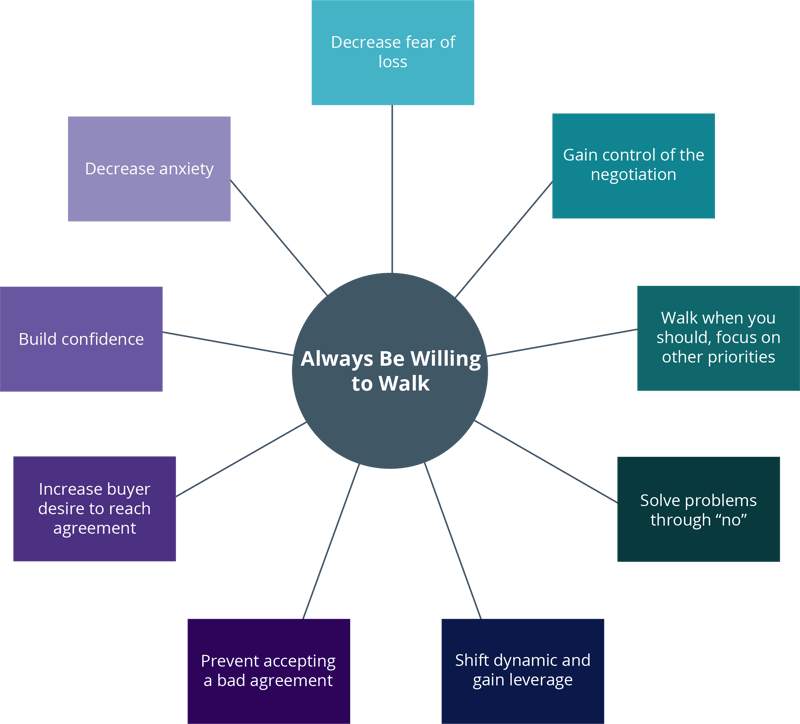Alison Brooks and Maurice Schweitzer, two researchers at the Wharton School at the University of Pennsylvania, conducted an experiment to induce varying levels of anxiety among negotiators.
One group was subjected to the not-so-melodious screeching strings from Psycho. The other group was treated to calming Water Music by Handel. After listening for a while, the groups were sent off to conduct simulated negotiations.
The post-Psycho negotiators were anxious, and they negotiated quite differently. They had lower expectations, made lower first offers, responded more quickly to first offers, and exited the negotiation sooner than the post-Handel group. The authors of the study surmised that if "incidental" anxiety triggered by unrelated stressors could negatively affect negotiation behavior and results, then anxiety stemming from the negotiation itself should have an even greater effect.1
Anxiety is the most common emotion associated with negotiations. Our field work confirms that anxious negotiators don't perform well. They show weakness that others exploit, make and take lower offers, give up too soon, and typically have trouble thinking straight.
When negotiators are feeling calm and clear-headed, the difference is stark.
The idea, then, is to decrease anxiety to increase success. Decreasing anxiety seems like a tall order, but changing how you think about each negotiation can go a long way.
All you have to do is be indifferent to the result of the negotiation. In other words, you should always be willing to walk away.
This doesn't mean you don't want the sale. You can want the sale, but you can never need it (or be perceived to need it). Being willing to walk is an incredibly freeing feeling. It means that if the sale doesn't happen—or it can't happen at terms that are favorable to you—then no big deal.
In fact, the faster you can find this out the better, because then you can walk and free your time to focus on more fruitful activities.

Being willing to walk, and knowing when you should walk (typically referred to as BATNA, or best alternative to a negotiated agreement) because you know what pricing and terms will not work for you, gives you something very powerful in a negotiation: control.
According to a study conducted by Harvard Business School's Michael Wheeler, "lack of control" is one of the three top sources of anxiety when negotiating.2 Gaining a sense of control is critical for your ability to negotiate a favorable outcome.
Sellers often feel like the buyer is in control of a negotiation. Buyers hold the decision power and the purse strings. They can exert pressure on sellers to lower prices, give more favorable terms, or otherwise squeeze sellers in a variety of ways. When sellers feel like they have no control, they signal they have a weak position and open themselves to being exploited by some buyers.
None of this is good.
Sellers, however, do have control. You, as a seller, can say no. You can walk.
Essential Rule of Sales Negotiation #1: Always Be Willing to Walk
You can want, but you can't need. Know when to walk. Walk when you should.
Knowing this for yourself—truly believing it—will change your negotiation outcomes for the good. You must, however, truly believe it. When you do, you'll be in the proper emotional state to lead the negotiation, build value, and create a great outcome for both you and the buyer.
How do you create this belief within yourself?
After reviewing dozens of animal, clinical, and neuroimaging studies, Columbia University researchers Sheena Iyengar and Kevin Oschner determined that exercising choice increases perception of control and "induce[s] greater feelings of confidence and success."3
You can choose to remain in the negotiation, or you can choose to walk away. You can also say no at any point to anything if it's not in your interest to say yes. In any case, you are in control because you can make choices.
The benefits of choice hold true even if you never actually exert control (i.e., you don’t walk away). It's enough to consider that you could walk away. As the researchers noted, "The benefits of perceived control can exist even in the absence of true control over aversive events, or if the individual has the opportunity to exert control but never actually exercises that option."
Know your BATNA. Write it out and keep it handy. Review it before major conversations to reinforce the fact that you are actively choosing to continue the negotiation process.
Always being willing to walk will help you curb your anxiety, and get you in the right frame of mind to succeed in negotiations. Signaling to the buyer that you want, but you certainly don't need, an agreement will also have a tremendously positive effect on your sales negotiation results in other ways.
Gaining Leverage through Indifference
The principle of least interest is an esoteric concept coined in 1938 that states that the power in relationships of all types—business and otherwise—lies with whoever cares the least. Or, perhaps more to the point, whoever appears to care the least. If you know your walk away point, and are willing to signal at any time that you are willing, even interested, in walking away, you increase your leverage.
Let's say you've been working on a sale for some time with a buyer. The buyer has invested quite a bit of time in seeing it through just as you have. Buyers, however, typically expect sellers to continue to invest time, and to make concessions in order to win a sale.
Buyers don't expect sellers to walk! A buyer might lose budget, change priorities, or simply decide not to move forward, but sellers walking away? Never!
Sellers who don't easily make concessions and instead say no or signal they are willing to walk are in a much better position to succeed for two reasons:
- Sunk cost fallacy. The sunk cost fallacy states that the more people invest in something, the more they value it and the harder it is to abandon it. By investing time and energy into buying something, buyers assume psychological ownership over the process. When they feel like they own the process, they place higher and higher value on seeing it through. They become reluctant to "lose" their investment without some sort of payoff.
- Fear of loss. Never underestimate fear of loss. People can become practically paralyzed by the feared pain associated with loss. Most people will take great measures to avoid that pain. In fact, much research suggests that fear of loss is twice as powerful psychologically as desire for gain (e.g., it's much more painful psychologically to lose $100 than it is satisfying to find $100).
You might be thinking, "Those reasons aren't logical, though."
If so, you'd be right. Decisions are often not logical. They're more emotional than we like to admit (even though they will likely later be justified rationally). People who don't know when to walk make emotional decisions, often accepting agreements not in their interests.
Know your BATNA, say no when you need to, and make sure the buyer knows you want this sale, but don't need it. Do so and you'll be well on your way to successful sales negotiations.
Learn about the other Essential Rules of Sales Negotiation:
- Essential Rule of Sales Negotiation #2: Build Value
- Essential Rule of Sales Negotiation #3: Lead the Negotiation
- Essential Rule of Sales Negotiation #4: Effect Emotions
- Essential Rule of Sales Negotiation #5: Trade, Don't Cave
- Essential Rule of Sales Negotiation #6: Plan to Win
1 A.W. Brooks and M.E. Schweitzer, "Can Nervous Nelly Negotiate? How Anxiety Causes Negotiators to Make Low First Offers, Exit Early, and Earn Less Profit," Organizational Behavior and Human Decision Processes 115, no. 1 (2011): 43-54, http://www.hbs.edu/faculty/Pages/item.aspx?num=45137.
2 Kimberlyn Leary, Julianna Pillemer, and Michael Wheeler, "Negotiating with Emotion," Harvard Business Review, Jan. & Feb. 2013, https://hbr.org/2013/01/negotiating-with-emotion.
3 Lauren A. Leotti, Sheena S. Iyengar, and Kevin N. Ochsner, "Born to Choose: The Origins and Value of the Need for Control," Trends in Cognitive Sciences 14, no. 10 (2010): 457-463, https://www.ncbi.nlm.nih.gov/pmc/articles/PMC2944661/.

Lead confident, collaborative, and positive negotiations.
Get resources and tools to improve your negotiation outcomes in our Mastering Sales Negotiations Toolkit. Download Now >>





